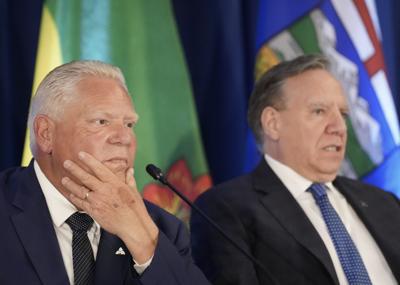HUNTSVILLE, Ont. — Premiers from across the political spectrum are vowing to hold Prime Minister Mark Carney’s feet to the fire on tougher bail rules for anyone charged with violent crimes like home invasions.Â
Provincial leaders wrapped up their annual meeting Wednesday with notes of caution — and points of looming tension — on bail reform, immigration, asylum-seekers and health-care funding for Carney, who has enjoyed a glowing relationship with them amid an escalating trade war with U.S. President Donald Trump.Â
Federal bail reform legislation is expected this fall.
“We talked about the need for real bail reform that keeps criminals behind bars and keeps our communities safe,” said Premier Doug Ford, who has chaired the premiers’ Council of the Federation for the last year and passes the role to P.E.I Premier Rob Lantz on Aug. 1.
“Prime Minister Carney has made it clear in his comments to premiers, and we’ll be holding him accountable,” added Ford, who freed up a bedroom for the PM at his cottage south of Huntsville on Monday night after a dinner with the premiers and a private chat in front of a roaring fire.
“We want full-fledged bail reform and I’d love to see mandatory sentencing so when someone breaks into your home, puts a gun to your head, terrorizes your neighbourhood, (he) doesn’t get out on bail after being out on bail five times,” said the Progressive Conservative premier, who repeatedly blamed “weak-kneed judges.”
New Brunswick’s Susan Holt, a Liberal, agreed on the importance of tougher restrictions on bail for “people who do bad things” and David Eby, NDP premier of British Columbia, voiced support for a crackdown as well.Â
“I want to make sure intimate partner violence is a part of his (Carney’s) considerations around bail reform,” Eby told reporters, calling for GPS tracking “so that the victim is able to identify if the person is coming close to them.”Â
In a first for the council formed in 2003, a prime minister joined the premiers at Deerhurst Resort to convene a first ministers’ meeting Tuesday touching on issues of concern, while downplaying expectations for a trade deal with the U.S. by Trump’s Aug. 1 deadline.
“There’s a real desire to support each other, to learn from each other, and to work with the federal government that is showing a desire for collaboration and partnership that I don’t think we’ve seen for a while,” said Holt.
She told Ford that a steelmaker in New Brunswick produces I-beams for construction — something he didn’t know was available from a domestic supplier as all premiers are looking for more opportunities to buy Canadian in the rush toward “nation-building” infrastructure projects.
The premiers also committed to erasing most interprovincial trade and labour mobility barriers by December, making it easier and cheaper for consumers and workers in one part of the country to buy products from or get jobs in other provinces.Â
On the shrinking prospects of a trade deal before the deadline, Alberta Premier Danielle Smith said it appears the U.S. is looking to do more sectoral agreements in areas such as automobiles and aluminum before fully renegotiating the Canada-U.S.-Mexico free trade agreement, which Trump is now breaking with his tariffs on steel and aluminum.
“If we can come up with some kind of common agreement on those issues, those sectoral agreements, by Aug. 1, we’ll look at that as a win,” she said.
Quebec Premier François Legault praised the gathering with Carney as a way of speeding up national consensus-building at a critical time, with Canada’s economy expected to slow and more jobs to be lost because of Trump’s tariffs.
“We were lucky to have a two-for-one,” Legault said in French before making it clear he’s pleased other premiers share his province’s concerns about a lack of provincial control over immigration and asylum-seekers, increasing pressure on Carney.
“You’re used to hearing Quebec demanding full powers over immigration and what I heard today is this is pretty much a unanimous demand of all the provinces,” Legault said in French.
Ford said the problem is asylum-seekers waiting too long — sometimes two years — for federal work permits, with provinces footing the tab for their accommodations, education and health care in the meantime.
“It’s costing our province an absolute fortune,” he said.
Accordingly, Ford added, premiers have agreed to use their authority under Section 95 of the Constitution to issue their own work permits, citing overlap between federal and provincial powers.
“I’m not waiting any longer,” he said firmly.Â
It was not immediately clear how provincial permits could legally bypass the federal asylum claims approval process, but a source in the premier’s office told the Star provincial legislation is likely required. Ontario’s legislature is not scheduled to return until Oct. 20.Â
Despite the focus on trade, health-care funding from the federal government was another hot topic for the premiers as costs rise with a growing and aging population, the higher costs of new technologies and more breakthrough drugs targeted at specific and rare diseases.
The percentage of federal funding has been on the decline, said Saskatchewan Premier Scott Moe, calling for more flexibility in how money is spent.
“Things are very different in the territories versus the Prairies versus Atlantic Canada versus some of our more populated provinces, like British Columbia, Ontario or Quebec,” he said.
Ford complained Ontario is paying an “unfair” share into the federal equalization program, sending $26 billion more to Ottawa than it gets back.
Error! Sorry, there was an error processing your request.
There was a problem with the recaptcha. Please try again.
You may unsubscribe at any time. By signing up, you agree to our and . This site is protected by reCAPTCHA and the Google and apply.
Want more of the latest from us? Sign up for more at our newsletter page.



























To join the conversation set a first and last name in your user profile.
Sign in or register for free to join the Conversation